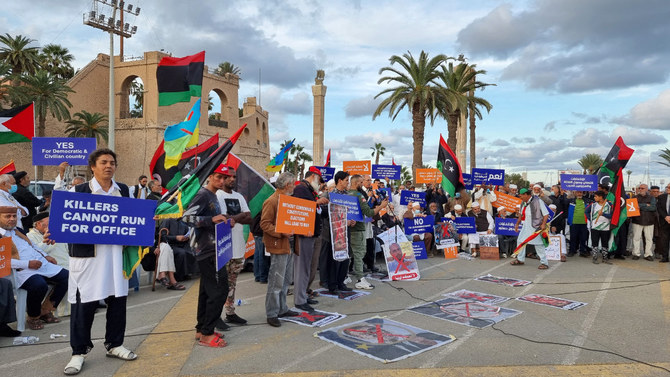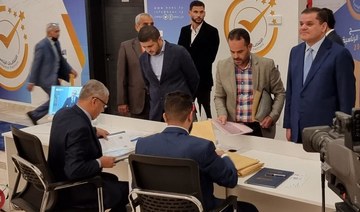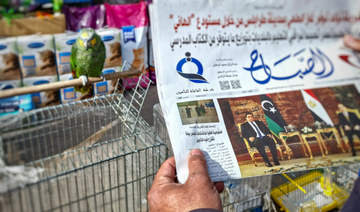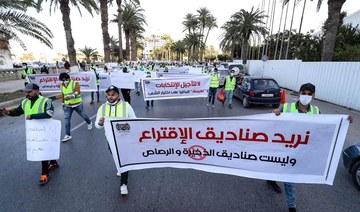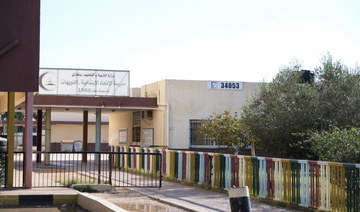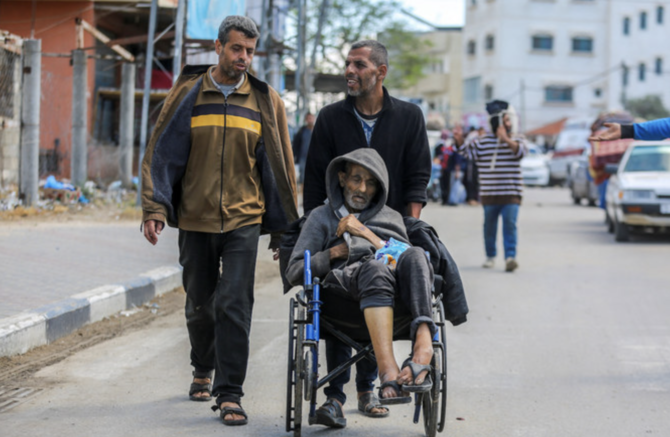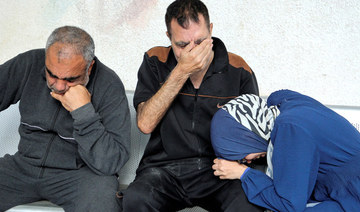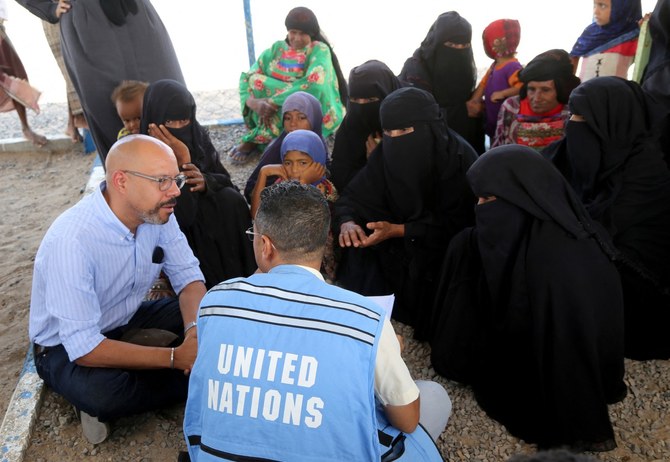DUBAI: Libya occupies a sensitive position for the security of Arab and European countries and in managing the Mediterranean region’s migration flows. Yet a road map for the restoration of the oil-rich nation’s security and stability continues to elude the international community.
Libya’s first presidential election since the overthrow of dictator Muammar Qaddafi in 2011 was due to take place on Dec. 24, amid hopes of finally unifying the war-torn North African country after years of bitter upheaval.
However, just two days before the UN-sponsored polls were due to open, the vote was postponed amid logistical hurdles and ongoing legal wrangling over election rules and who is permitted to stand.
Libya’s electoral board called for the election to be postponed for a month, until Jan. 24, after a parliamentary committee tasked with overseeing the process said it would be “impossible” to hold the vote as originally scheduled.
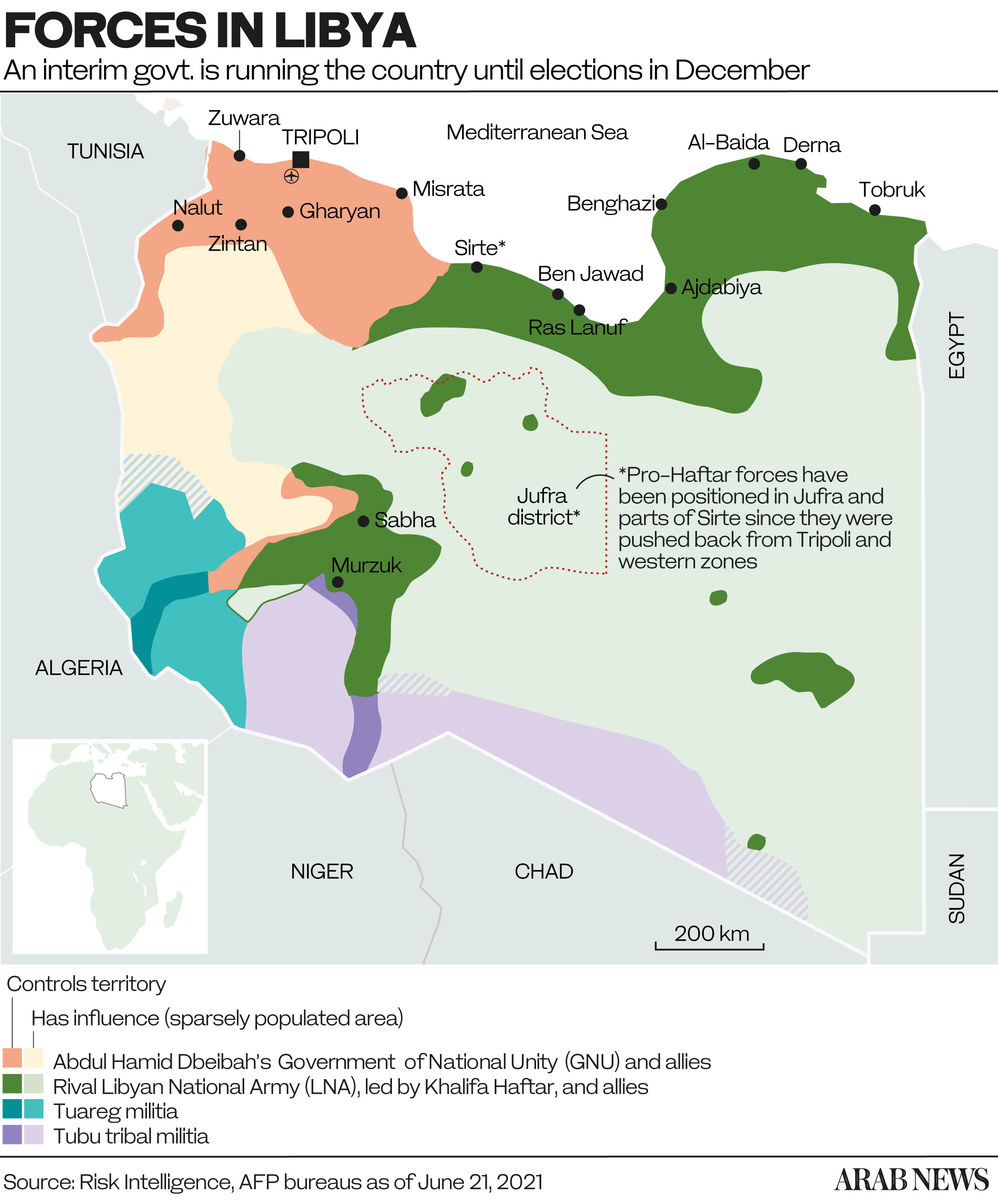
Even now, 10 days into the new year, it is unclear whether the election will go ahead at all. Many fear that the fragile peace in the country could collapse if disputes over the election are not resolved quickly.
Any further delay would deal a significant blow to the international community’s hopes of reunifying the country.
“This is a critical moment for Libya and the indications are increasing, day by day, that we are running out of time to have a free and fair election,” Ben Fishman, a senior fellow at the Washington Institute for Near East Policy, told Arab News.
“The multiple court cases against leading candidates has limited the campaign season. This all shows that these elections are not being run on an agreed constitutional basis. More time is needed to resolve fundamental issues, not just on who is able to run but also on what the powers of the president will be.”
Without an agreement concerning those powers, Fishman said, the election could result in an “increasing recipe for more polarization, as well as an increasing potential for more violence and not less.”
One particularly controversial candidate to emerge ahead of the vote is Saif Al-Islam Qaddafi, the son of Muammar Qaddafi and a strong contender for the presidency.
On Nov. 24, a court ruled him ineligible to run. His appeal against the decision was delayed for several days when armed militiamen blocked the court. On Dec. 2, the ruling was overturned, clearing the way for him to stand.

A handout picture released by the Libyan High National Commission on Nov. 14, 2021, shows Seif Al-Islam Qaddafi (right) registering as presidential candidate. (AFP/Libyan High National Electoral Comission)
A Tripoli court sentenced Qaddafi to death in 2015 for war crimes committed during the battle to prolong his father’s 40-year rule in the face of the 2011 NATO-backed uprising. However, he was granted an amnesty and released the following year by the UN-backed government. He remains a figurehead for Libyans still loyal to the government of his father.
Qaddafi is not the only divisive candidate. Field Marshal Khalifa Haftar, who in September temporarily suspended his command of the Tobruk-based Libyan National Army to run for office, also faces legal proceedings for alleged war crimes.
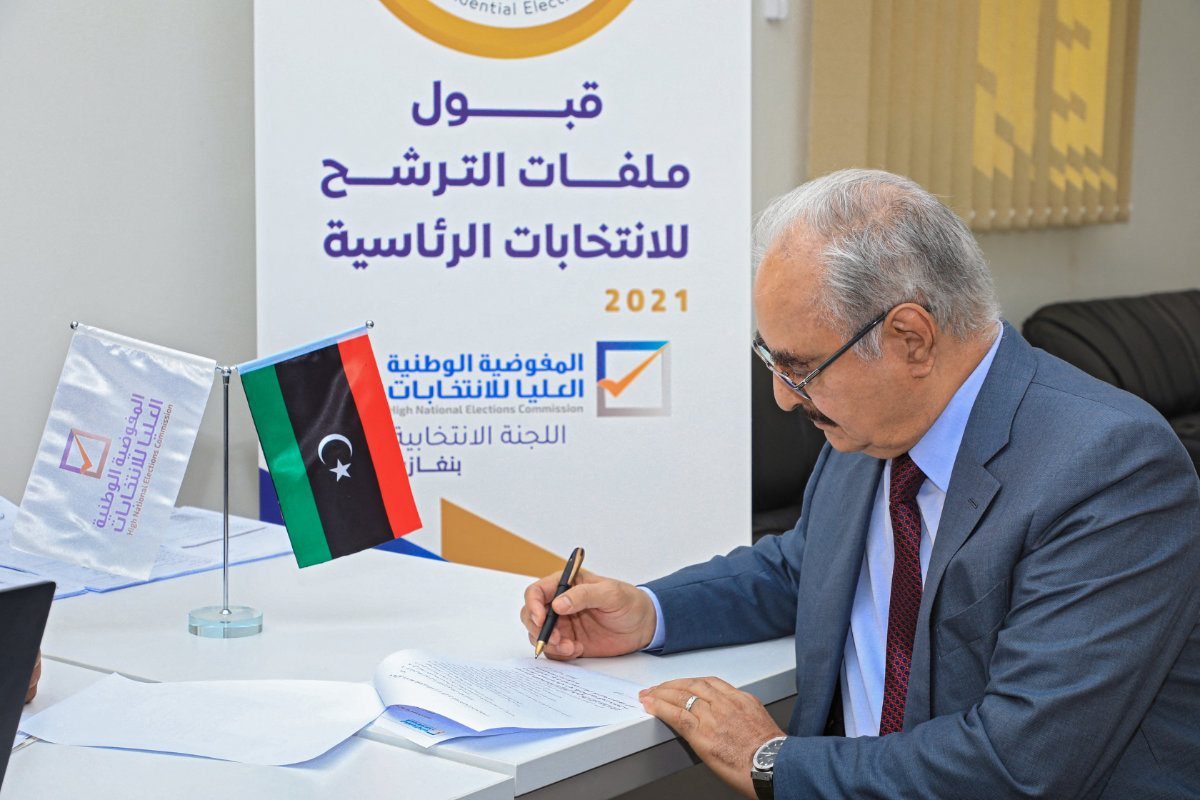
Khalifa Haftar submits documents for his candidacy for the Libyan presidential election at the High National Election Commission in Benghazi on Nov. 16, 2021. (AFP)
According to Jonathan Winer, a scholar at the Middle East Institute and a former US special envoy for Libya, the chances of success for the election were seriously undermined from the beginning when the Haftar-affiliated House of Representatives devised the rules.
“These elections have become increasingly chaotic,” he said. “The process over who gets disqualified and who doesn’t is, at least, somewhat flawed, imperfect, and with so many candidates the idea that anyone would get a majority is ludicrous — no one will get a majority.”
Given the ongoing disputes, Dalia Al-Aqidi, a senior fellow at the Center for Security Policy in Washington, D.C, believes even Jan. 24 is overambitious for a rescheduled vote.
“Despite all the continuous calls for the importance of holding the Libyan presidential elections to help the country to cross to safety and prevent a new wave of violence, the possibility of this happening is slim due to the lack of agreement between the major key players, divisions on the ground, and foreign interference,” Al-Aqidi said.
“Holding elections in January is a difficult task since none of the obstacles that led to postponing the electoral process were addressed or dealt with by local leaders nor the international community.
“Less than one month is not enough time to solve all the issues that prevented the Libyans from casting their votes and that includes the conflict over the nomination of candidates.”
FASTFACTS
Factions continue to disagree over basic electoral rules and who can run for office.
Parliamentary committee said it would be “impossible” to hold the vote as scheduled.
Al-Aqidi is concerned that factional fighting could resume if foreign interference continues. “The likelihood of violence and chaos is very high, especially with the increase of the Muslim Brotherhood’s efforts in the country due to its loss everywhere else in the region,” she said.
“The group, which is supported by Turkey, is looking at Libya as an alternative to Tunisia, which was its last stronghold.”
The Washington Institute’s Fishman also doubts the election will take place later this month, but remains cautiously optimistic that a serious uptick in violence can be avoided if dialogue continues.
“It appears now that an immediate threat of violence is less likely as different actors are talking about next steps,” he said. “Because of these talks, the date is likely to be extended beyond late January, or even several months after.
“The international community should support these internal Libyan talks and UN-brokered conversation and not take a specific position right now on the timing of elections until a better consensus is more clear.”
The appointment on Dec. 7 of Stephanie Williams as UN special adviser on Libya offers some hope of getting the process back on track. Williams led the talks that resulted in the October 2020 ceasefire in Libya.
“She’s deeply immersed in the issues and knows all the parties, and can hopefully pull a rabbit out of a hat and do what her predecessor was not able to do and come up with a game plan and a timeline,” said Fishman.

Stephanie Williams, UN special adviser on Libya. (AFP)
The road to the presidential election in Libya was never going to be easy. In August 2012, after the fall of Muammar Qaddafi, the rebel-led National Transitional Council handed power to an authority known as the General National Congress, which was given an 18-month mandate to establish a democratic constitution.
Instability persisted, however, including a string of major terrorist attacks targeting foreign diplomatic missions. In September 2012, an assault on the US consulate in Libya’s eastern city of Benghazi left US ambassador Chris Stevens and three other Americans dead.
Responding to the threat, Haftar launched an offensive against armed groups in Benghazi in May 2014. He named his forces the Libyan National Army.
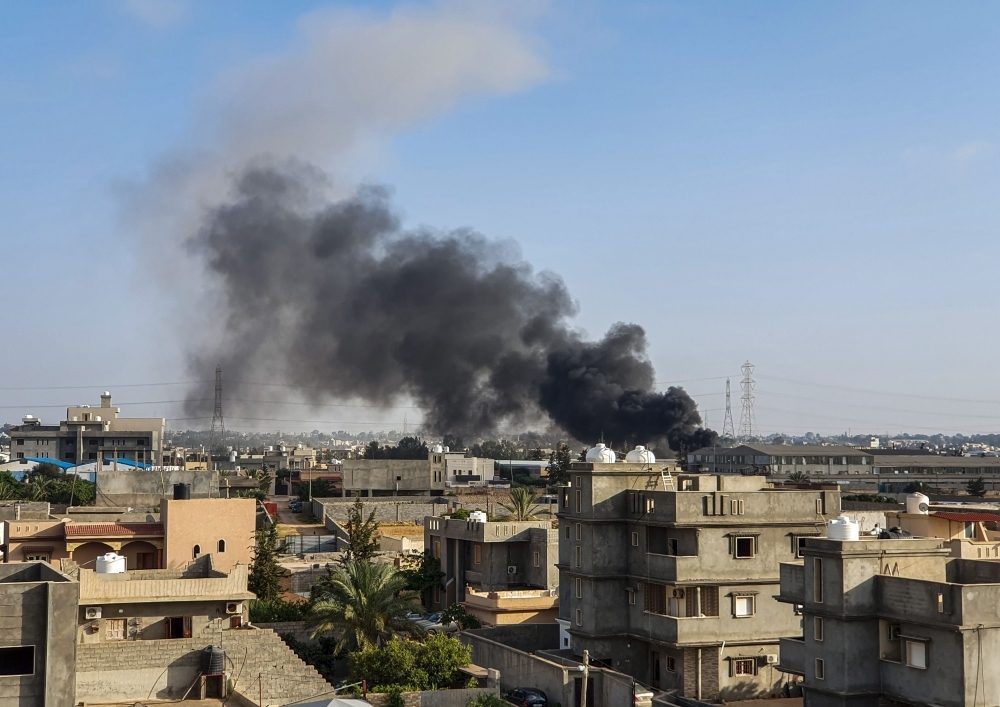
Smoke rise in Tajoura, south of Tripoli, following an airstrike on the Libyan capital by forces loyal to Gen. Khalifa Haftar sometime in mid-2019. (AFP file photo)
Elections were held in June 2014, resulting in the eastern-based parliament, the House of Representatives, which was dominated by anti-Islamists. In August that year, however, Islamist militias responded by storming Tripoli and restoring the GNC to power.
The House of Representatives took refuge in the city of Tobruk. As a result, Libya was divided, left with two governments and two parliaments.
In December 2015, after months of talks and international pressure, the rival parliaments signed an agreement in Morocco establishing a Government of National Accord. In March 2016, GNA chief Fayez Al-Sarraj arrived in Tripoli to install the new administration. However, the House of Representatives did not hold a vote of confidence in the new government and Haftar refused to recognize it.
In January 2019, Haftar launched an offensive in oil-rich southern Libya, seizing the capital of the region, Sabha, and one of the country’s main oilfields. In April that year he ordered his forces to advance on Tripoli.
By the summer, however, after Turkey deployed troops to defend the administration in Tripoli, the two sides had reached a stalemate.
A UN-brokered ceasefire was finally agreed in Geneva on Oct. 23, 2020. It was followed by an agreement in Tunis to hold elections in December 2021.

A Libyan man registers to vote inside a polling station in Tripoli on November 8, 2021. (AFP)
A provisional Government of National Unity, headed by Abdul Hamid Dbeibah, was approved by lawmakers on March 10, 2021. On September 9, however, Aguila Saleh, the speaker of the House of Representatives, ratified a law governing the presidential election that was seen as bypassing due process and favoring Haftar. (In November Saleh himself threw his hat into the ring.)
Subsequently, the House of Representatives passed a vote of no-confidence in the unity government, casting the election and the hard-won peace into doubt.
Even if an election does take place in January, Libya still has a long way to go before a stable administration is formed and a durable peace is achieved.
___________________
• Twitter: @rebeccaaproctor





